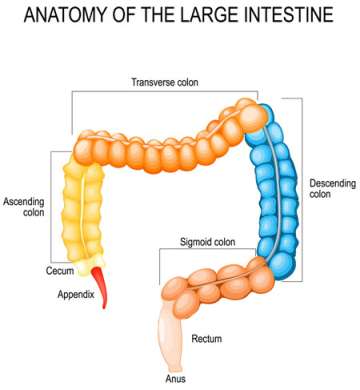Colon Cancer
Find your care
Our integrated care team provides comprehensive treatment plans to give you the best chance for a cure. Call 888-662-8252 to learn more about our gastrointestinal oncology services.
Colon cancer is the second-leading cause of cancer deaths among adults in the U.S. Anyone can be at risk. That’s why it is essential to receive a personalized diagnosis and colon cancer treatment plan.
The UCLA Gastrointestinal Oncology Program brings together nationally recognized leaders in their specialties. These experts have experience in the latest therapies. They offer time-tested treatments and clinical trials of the newest advances. Here, you’ll receive coordinated care for your best chance against colon cancer.
What Is Colon Cancer?

Colon cancer develops when cells mutate (change) in the colon. The colon, also known as the large intestine, is the tube that makes up the last part of the digestive tract. Colon growths, called polyps, can become cancerous over time. The most common type of colorectal tumor is called adenocarcinoma.
The colon and the rectum consist of similar cells and can develop the same types of cancer. Cancer in the rectum is called rectal cancer. Together, these cancers are called colorectal cancer.
Risk factors that increase a person’s likelihood of developing colon cancer include:
- Family history of colorectal cancer
- Inherited syndromes like Lynch syndrome or familial adenomatous polyposis (FAP)
- Colon problems such as Crohn’s disease or precancerous polyps
- Diet high in charred, processed or red meat
- Inactive lifestyle or being overweight
What Are the Symptoms of Colon Cancer?
Many symptoms of colon cancer can be mistaken for other conditions, like gastrointestinal (GI) upset. If these symptoms last longer than a week or so, talk to a doctor:
- Diarrhea, constipation or feeling like you need to have a bowel movement
- Narrowing of the stool
- Blood in the stool or dark stools
- Pain or cramping in the abdomen (belly)
- Fatigue, weakness or unexpected weight loss
How Is Colon Cancer Diagnosed?
Regular colonoscopies are important to screen for precancerous polyps (growths) or possible colon cancer. To confirm a colon cancer diagnosis, doctors may use:
- Physical exam: Your doctor will feel your abdomen and examine the rest of your body. The doctor may do a digital rectal exam, inserting a gloved finger into your rectum to check for lumps or growths. Meet our doctors >
- Stool tests: Two tests can check for blood in your stool, which can be a sign of colon cancer. You can do the fecal occult blood test (FOBT) or fecal immunochemical test (FIT) at home.
- Blood tests: Your doctor will order a complete blood count and other tests to check for unusual blood markers. The lab can check for tumor markers, substances that a colorectal tumor releases into the blood. They can also check liver enzymes, which can indicate if cancer cells have spread to your liver.
- Diagnostic colonoscopy: To check the location and status of colon growths, your doctor may do a diagnostic colonoscopy. During this test, the doctor can take a sample (biopsy) of a growth in the colon. The laboratory evaluates the biopsy sample, including doing genetic testing, to provide a diagnosis.
- Imaging: Doctors may use imaging to see the size and location of cancerous cells. Imaging can also reveal how far cancer has spread or how well treatment is working. For colon cancer, you may get ultrasounds, X-rays, CT scans, PET scans or MRI scans. Learn more about our imaging technology.
- Genetic testing: Testing a tumor’s genetic makeup can help tell your doctor what caused the tumor to grow and how best to treat it. The most common mutations, BRAF, EGFR and KRAS, have specific treatments. Read about cancer genetics.
How Is Colon Cancer Treated?
If doctors diagnose colon cancer, they will talk with you about the tumor’s size and location (stage). They will also determine whether it has spread (metastasized) in your body. Then your team will discuss your options with you. UCLA offers the most advanced treatments for all stages and degrees of colon cancer. Colon cancer treatment may be local, like surgery or radiation, or systemic, like chemotherapy or immunotherapy.
Local treatments
Local colon cancer treatments remove or destroy cancer cells in one area. Local treatment includes:
- Nonsurgical polyp removal: Your doctor may use a procedure called endoscopy to remove polyps or concerning cells during a colonoscopy. UCLA’s colorectal cancer team includes advanced endoscopists who are skilled in removing complex polyps and tumors. Read more about interventional endoscopy.
- Surgery: At UCLA, you have access to all available types of surgery, including robotic and laparoscopic surgery. These minimally invasive treatments use tiny incisions, which can mean a faster recovery. Learn more about minimally invasive surgery for colorectal cancer.
Systemic treatments
Systemic colon cancer therapies attack cancer cells throughout your body, including at their source. Systemic treatments include:
- Radiation therapy: Radiation therapy uses powerful X-rays to destroy cancer cells. The newest methods deliver precise doses of radiation directly to the tumor to minimize damage to healthy cells. Read more about radiation oncology.
- Chemotherapy: UCLA’s doctors helped develop some of the medications in current use for metastatic colon cancer, including panitumumab (Vectibix®) and bevacizumab (Avastin®). Ongoing, large clinical trials are studying new medications.
- Biologic therapy: UCLA offers two types of biologic treatments, also called targeted therapy. One type, anti-angiogenesis therapy, starves tumors of blood flow. Another type, Epidermal Growth Factor Receptor (EGFR) Inhibitor, blocks the EGFR protein that doctors believe contributes to the growth of colorectal cancer.
- Immunotherapy: UCLA’s innovative researchers offer several trials of immunotherapy for colorectal cancer. Our doctors are directing two international trials using intratumoral injections of immune stimulants. See our clinical trials >
Contact Us
To schedule an appointment with the UCLA Gastrointestinal Oncology Program, please call the UCLA Cancer Hotline at 888-ONC-UCLA (888-662-8252) Monday through Friday, 9am to 5pm, or our Physician Referral Service at 1-800-UCLA-MD1 (800-825-2631).